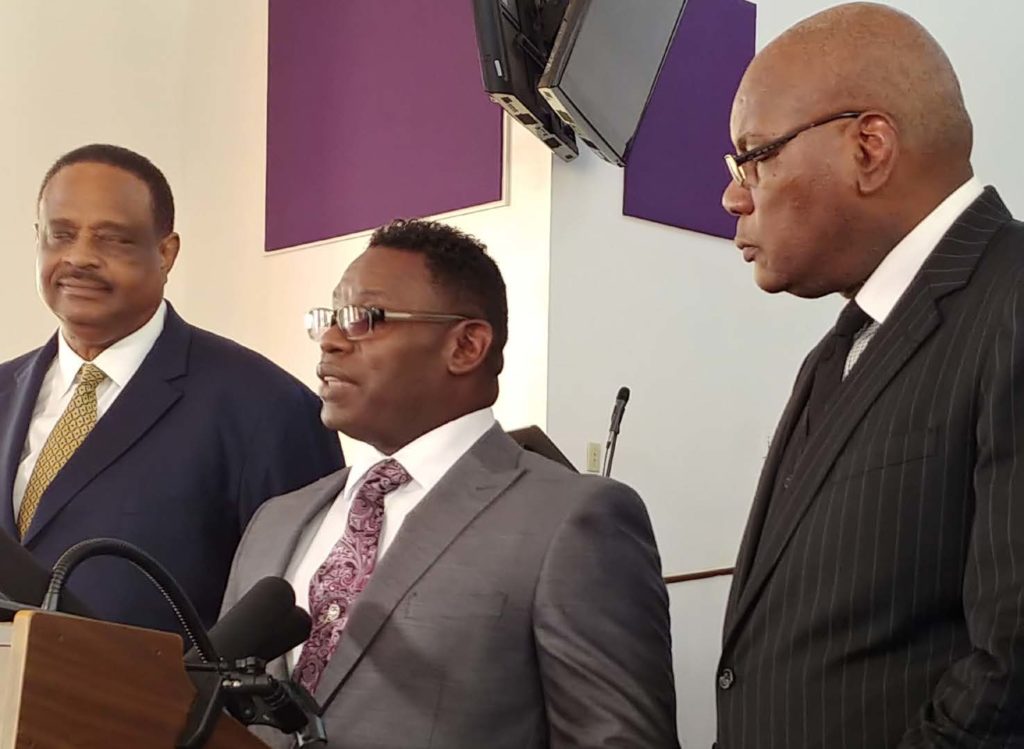
Leaders call for unified country, approval of Amendment 4
By St. Clair Murraine
Outlook staff writer

Pastor Mark McMillan, center, made the case for the approval of Amendment 4.
Expressing disgust with the state of the nation and tactics being used in the Florida gubernatorial race, a group led by members of the Tallahassee clergy Monday also called on voters to approve Amendment 4.
Voters get their chance on Tuesday to decide the fate of the amendment that would restore voting rights to more than 1 million ex-felons in Florida.
Throughout the press conference at Bethel Missionary Baptist Church, the group endorsed Andrew Gillum’s bid to become governor of the state.
The group led by Rev. R. B. Holmes, publisher of the Capital Outlook, also included Congressman Al Lawson and County Commissioner Bill Proctor.
One speaker after another appealed to President Donald Trump to tone down his racially charged and divisive rhetoric. Holmes and Lawson said Trump sends the wrong message that led to tragedies like the mass shooting at a Jewish Synagogue in Pittsburgh last weekend.
They also said the president has been the inspiration for hate crimes such as the recent bombs mailed to several leaders who have criticized his leadership style.
Trump, Holmes said, should “call the country to a higher ground.”
“If he continues to do what he is doing; supporting folks who slam reporters, making fun of disabled people, calling his opponents mobs; that’s just distasteful from the leader of a free world,” Holmes said.
He added: “The president ought to really recognize what he is doing to this country. It is not United States anymore; it’s divided states. He divides rich against poor (and) Black against White. That’s not what that office ought to be about.”
Lawson, a Democrat seeking reelection for a second term in Congress, said what the country is seeing also could be blamed on his Republican peers who are more concerned about their wellbeing than their constituents.
“Party comes first more so than people that are less fortunate; people who are struggling for a meal; people whose social security is the only form of retirement they’re going to have,” Lawson said.
At one point, former state representative Alan Williams interjected that the message from Washington is being transcended to young people.
“Our children, just a few years ago, had President Barack Obama as a benchmark of civility,” he said. “Now our children are playing this out in their schools (and) online. This is not the type of state we should be living in.
“If the president and other leaders don’t call out this hatred, then we are going to be in a worst place than we were before President Obama was elected.”
Holmes also used the platform to call out Gillum’s opponent Republican Ron DeSantis for character assignation. In particular, Holmes said some of DeSantis’ attacks are racist and untrue.
“I pray that the candidates will run this election based on ideas and vision,” he said. “I pray that Mr. DeSantis will tell us how he is going to build a stronger and better Florida.”
Soon after the August primary in which Gillum, Tallahassee mayor, became the first Black nominee for governor, DeSantis asked voters not to “monkey this up.”
That seemingly still bothers Holmes and others who spoke.
“Mr. Gillum’s policies did not come from the animal kingdom,” Holmes said. “They come from somebody; not with a tail, but a brain. Not an ape, but a human being. That term is still disgusting.”
The case for Amendment 4 was played out by Rev. Mark McMillan, who said “acting up and wilding out” as a young man led to his incarceration. However, after serving his time and changing his life, he still can’t vote in Florida.
“I think it’s important for people like me to have a voice,” said McMillan, who said he had his voting rights in Texas and New York before moving to Florida. “If I’m considered one of the faith leaders in the city, then it gives me the position to help lead those that don’t have a voice.”
Approval of Amendment 4 will take 60 percent of the votes cast in the state, one of three in which ex-felons can’t vote. “If voters approve the measure, people convicted of murder or sex crimes would not be eligible to regain their rights to vote.
Approval of the measure is “critically important,” Lawson said.
“We are standing in the right place to say that when citizens have paid their debt,” said Proctor, “it should not be a criteria to further frustrate the purposes of the 1965 voting act.”







